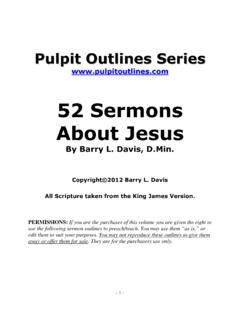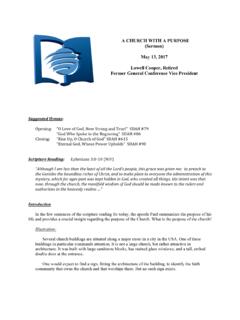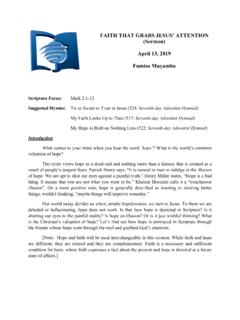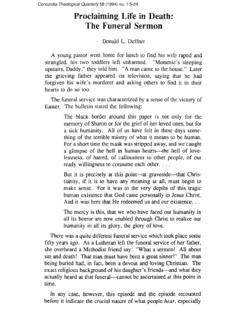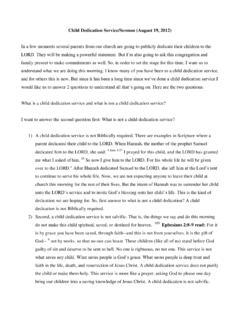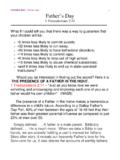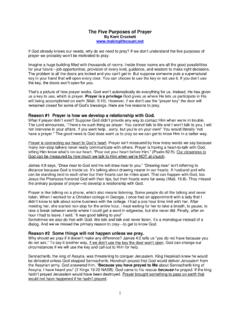Transcription of What Should I Do with My Life? A Sermon for Every Sunday ...
1 1 What Should I Do with My Life? A Sermon for Every Sunday , Year C William H. Willimon Luke 5:1-11 When I was a college chaplain, one of my major duties was to spend time with students pondering the question that obsessed them all: What Should I do with my life? It s a fair question for a young adult to be asking. What Should I do with my life? is the question universities were built to answer. Faculty lures students into abandoning family, tribe, and neighborhood, puts them through a food court of courses called the curriculum, makes possible for them to waste huge amounts of time with their peers (who know as little of life as they) and asks them to choose which courses I want take, even though they lack both the experience and the wisdom to know what they want. Though this pedagogy was previously unthinkable in the history of higher education, the university serves a mobile, demanding market by teaching students to ask, What Should I do with my life?
2 The is the modern way of growing up. Modernity compels us to write the story that defines who we are, heroically to choose from a variety of possible plots. I have come to believe that asking ourselves What Should I do with my life? is a question that Christians ought not to ask. The question is based on a whole set of presuppositions that Christians just don t believe are true. For Christians, the proper question throughout life is not, What do I want to do with me? but rather, Which God am I worshipping and how is that God having his way with me? 2 One of the most radical, countercultural texts in all of scripture is this one from the Psalms: It is God who hath made us and not we ourselves. (Psalm 100:3) None of us is self-made. There s not a person here who is forced to concoct yourself. What a relief to know that God likes to make things; you don t have to devise yourself from scratch.
3 In fact, it s a lie to think that you can. The best of being a Lutheran, explained a young Canadian, is baptism, when the church just tells you who you are. I ve spent my whole life trying to figure out which path to take (Look kid, your whole life consists of only twenty-four years; you haven t wasted that much time). So at my baptism the church doused me and said, Here s who God meant you to be, this is the life you were created to live. That we are not self-made implies that we are God s property to be called for, to be utilized as God pleases. Christians don t believe it s possible to make yourself up from scratch because we believe that God not only loves us but also calls us. We re talking that wonderful, peculiarly Christian word, Vocation. In the New Testament, calling or vocation refers to discipleship rather employment. We can be called to eternal life (1 Tim 6:12) or into fellowship with Christ (1 Cor.)
4 1:9), out of darkness into light (1 Pet 2:9), and into right relationship with God (Rom 8:30) but not to a career. Sure, Paul was a tentmaker (Acts 18:3) but nowhere is Paul called to be a tentmaker. Tent-making put bread on the table, justification enough for Paul to give it his best. Paul was called to be an apostle; his vocation from God was to spread the good news to the Gentiles that they were included in the promises of God to Israel. Remember High School Career Day? At least at my high school, that s when they invited people into the school from the community to talk about their jobs. A nurse, 3 a teacher, a salesperson, a chef would each be given ten or fifteen minutes to recruit us to the job they were doing. A major question we were urged to ask ourselves was, What am I good at? What do I enjoy doing? Those questions are fine to ask but they are not the way of Christian vocation.
5 I like working with people or I m good with words, so is not the way of vocation. How about nursing sick people? No? Have you thought about coaching an NFL team? That doesn t appeal? Hey, what about advertising? I ve got it! Run for President; any fool can do that. Vocation, Christian vocation, is not evoked by your bundle of need and desire, what you want. Vocation is what God wants from you whereby your life is transformed into a consequence of God s redemption of the world. The talents God gives at birth are nothing compared to the gift of vocation. Look no further than jesus s disciples remarkably mediocre, untalented, lackluster yokels to see that innate talent or inner yearning has less to do with vocation than God s thing for redeeming lives by assigning us something to do for God. Vocation is not an inclination within awaiting discovery by rooting around in the recesses of the ego, or a means of getting what I want out of life.
6 As jesus succinctly says, Ye have not chosen me, but I have chosen you, and ordained you, that ye Should go and bring forth fruit (John 15:16). I ll put that verse up there with It is God who hath made us and not we ourselves, as one of the most important and countercultural verses in scripture. jesus looks at his disciples and says, Don t ever forget. Discipleship, working with me was my idea before it was yours. You didn t search for something fulfilling to do with your life and then chose me. I chose you. Why did I choose you? 4 So that you could have a happier, more fulfilling life? Forget it! I chose you that you might go and bear fruit for me. The God who chose Israel and the church is a sucker for the likes of me, to say nothing of you. You can look it up. jesus begins his work not by a solo dive into ministry but by putting the finger on a dozen knuckleheads and commissioning them to do what he wants done in the world, calling for them in order that they Should go and bring forth fruit.
7 I ve got Christian vocation on my mind because of this Sunday s gospel. After a frustrating night of failed fishing, jesus s disciples say, We ve been out here all night and have caught noting. jesus tells them to cast their nets on the other side of the boat, in deeper water. They obey. When the nets are pulled in, they are bursting with a miraculous catch of fish. Simon Peter blurts out, Depart from me jesus ! I m a sinful man! Peter is clearly overcome with awe by the majesty, the glory of Christ. Luke says that James and John were amazed too. jesus doesn t go away from Peter. Rather, jesus says to confessed sinner Peter, Don t be afraid. From now on, you will be fishing for people. Not leaving Peter in his awe and fear, not saying one word in response to Simon s confession of sin, jesus enlists Peter to join with him in his work of outreach to the whole world.
8 Then Luke says, As soon as they brought the boats to the shore, they left everything and followed jesus . A miraculous catch of fish is followed by the miracle (a miracle is a surprising act of God) of calling sinful Simon to be a disciple. This vocation story is a corrective 5 for some of our misconceptions about Christian vocation. Maybe you ve heard that jesus s summons is based upon his assessment of your gifts, his insight into your hidden talents. No. Like Simon, you and I are just sinners, sometimes failures at our day jobs, sometimes overwhelmed by the glory of jesus . And jesus s call comes only to people like us. His call is not based upon our potential, or our merits but upon his grace. His call to us is his undeserved, unearned gift to us. As jesus said, You did not choose me, I chose you. Why? So that you would bear fruit. So that we would produce good works for him.
9 So that we would bring in a miraculous catch of disciples. Simon didn t make himself a disciple by his decision or his astute assessment of his gifts. He is made a disciple by the work of Christ. It is God who hath made us and not we ourselves. And Simon, James, and John leave everything and follow jesus . God s got some form of discipleship in mind for everybody therefore everyone can expect vocation, that peculiar way God uses you, creation of God, in God s salvation of the world. One of the happiest aspects of my happy pastoral life is watching the ways in which God calls some to write letters to the incarcerated, others to do time on the Church Finance Committee, to empty the bedpans of those in need, to raise a couple of godly children, or to set a good table for the hungry, even to be a public school teacher and a Christian at the same time. At an inner city church, Wednesday morning prayer breakfast (God and a sausage biscuit at an ungodly hour), I piously asked the assembled laity, Pray for Mary.
10 Johnny was booked last night. DUI. I m going to see what I can do to get him out. Mary s had a time with that boy. 6 How much you know about alcoholism, said one of the men, unimpressed by my pastoral care. Where you going to get the money for bail? asked another. We ll go with you. Take this off the prayer list. We can handle it. The three of us walked into the dark bowels of the jail where we saw a frightened youth, huddled in the corner of a cell, weeping. Son, how long have you had a problem with alcohol? one of the men asked through the bars. Uh, I wouldn t say I have a problem, Allen replied. Let me rephrase that. How long have you been lying about your problem? Son, I ve learned a lot about booze the hard way. Had that monkey on my back since I was in the army. I can show you the way out. We re springing you, said the lawyer. And you come home with me.

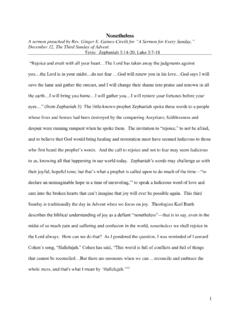

![The Fourth Sunday of Advent [Year C]](/cache/preview/0/c/2/2/8/1/4/a/thumb-0c22814a4a423d1980c27aa4518e67a1.jpg)

